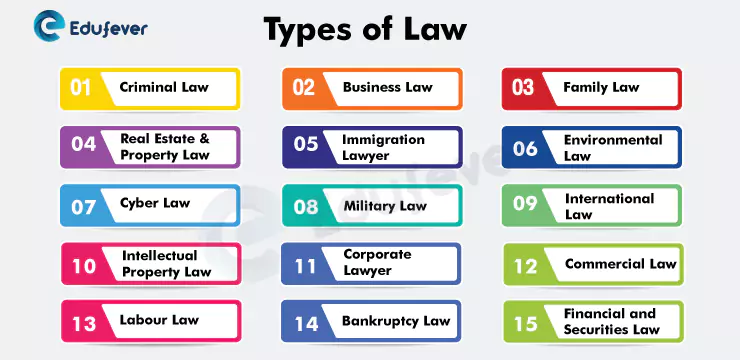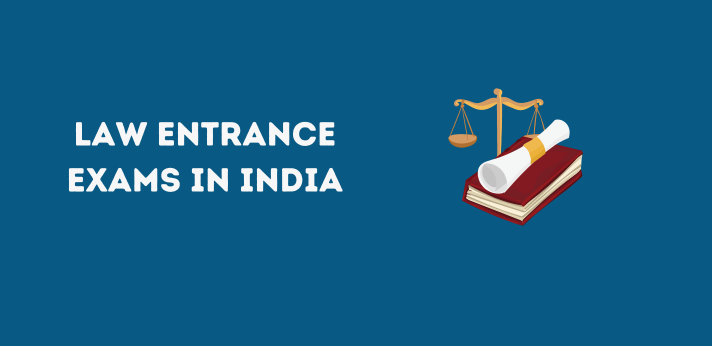Law Entrance Exams in India: Lots of students aspire to become lawyers and are enthusiastic about a legal career. However, they often wonder about the opportunities that law can provide. When you study law, you get the chance to acquire new skills and knowledge across different areas of life. It helps you sharpen your abilities, expand your understanding, and gain experience in humanities and social sciences. You can specialize in the areas that interest you the most, deepening your expertise. Renowned law colleges like National Law Universities and top private law schools offer law education. Admission to these colleges in India is granted only to candidates who have passed a law entrance exam.
Throughout this article, you will get detailed information about the entrance of Law colleges in India, which how many Law entrance exams in India you have clear to gain admission to Top Law colleges in India; read the complete article to get the complete information like admission procedure, registration date, exam date top college etc.
“In my view, pupils who have done an undergraduate Law degree start with a very considerable advantage over those who have tried to cram in everything in less than a year. A Law degree allows a student to gain a broader and more mature understanding of the subject.”
-Jonathan Hirst QC, former Chairman of the Bar of England and Wales
Quick Facts
This section will give you a short overview of the law entrance exams in India; let’s see.
| Particular | Description |
|---|---|
| Courses Name | BA LLB, BBA LLB, B.Com LLB, LLB, LLM etc. |
| Course Level | UG & PG |
| National Level Law Entrance | CLAT, AILET, LSAT |
| Course Duration | UG: 3-5 Years PG: 1 Year |
| Stream | Law |
| Examination Type | Yearly/Semester |
Types of Law
Though you are not required to choose a specialisation when enrolling in law schools worldwide, staying current on the fields where you can gain expertise is always a good idea. The graph below depicts the various areas in which you can gain expertise:

Top Law Courses
Here are the top law courses available across various specialisations and education levels:
| BCom LLB | BA LLB |
| BBA LLB | BSc LLB |
| LLB | LLM |
| Master of Business Law (MBL) | MBL-LLM |
Law Entrance Exams in India
When you decide to start your career in Law, it’s time to know how many entrance exams in India; this section will help you.
Top National Level of Entrance Exam in India
This section will provide information about the Top national-level entrance exam in India; let’s look.
| Exam Name | Conducting Authority | Exam Date |
|---|---|---|
| CLAT (Common Law Admission Test) | NLUs (National Law Universities) | To be announced Soon |
| AILET (All India Law Entrance Test) | National Law University Delhi | To be announced Soon |
| LSAT (Law School Admission Test) | Pearson VUE | To be announced Soon |
| DUET (Law) | University of Delhi | To be announced Soon |
Top State Level of Entrance Exam in India
This section will provide information about the Top state-level entrance exam in India; let’s look.
| Exam Name | Conducting Authority | Exam Date |
|---|---|---|
| AP LAWCET | APSCHE | To be announced |
| TS LAWCET | TSCHE | To be announced |
| Kerala LLB Entrance Exam | Commissioner of Entrance Examination | To be announced |
| TS PGLCET | Osmania University, Hyderabad | To be announced |
| AP PGLCET | APSCHE | To be announced |
Top University/Institute Level Law Entrance Exam
This section will provide information about the Top University/Institute entrance exam in India; let’s look.
| Exam Name | Conducting Authority | Exam Date |
|---|---|---|
| MH CET Law | State Common Entrance Test Cell, Maharashtra | To be announced |
| CULEE (Christ University Law Entrance Exam) | Christ University | To be announced |
| UPES Law Studies Aptitude Test (ULSAT) | UPES Dehradun | To be announced |
| BVP CET Law | Bharati Vidyapeeth University | To be announced |
| BHU UET (Law) | Banaras Hindi University (BHU) | To be announced |
Top Law Entrance Exam Overview
This section will provide more detailed information about the Top Law entrance exam overview; let’s check.
CLAT 2023
| Particular | Details |
| Conducting Body | The consortium of NLUs and the Bar Council of India. |
| Application Mode | Online |
| Application Fees | INR 4,000 for (Gen/OBC/PWD/NRI) and INR 3,500 for reserved categories |
| Duration | 2 hours |
| Number of Questions | 150 for UG and 120 for PG |
| Exam Mode | Offline (pen-paper based) |
| Eligibility | 10+2 from a recognised Board, and one must have passed them with a minimum aggregate of 45% marks. There will be a relaxation of 5% on the minimum marks for the candidates belonging to reserved categories, and there is no age limit for taking the exam. |
DU LLB Entrance exams Highlights
| Particular | Details |
| Conducting Body | NTA (National Testing Agency) |
| Eligibility | Must have completed 10+2 with at least 50% marks from a recognised Board |
| Application Mode | Online |
| Application Fees | INR 750 for (Gen/OBC/PWD/NRI) and INR 300 for reserved categories |
| Duration | 2 hours |
| Number of Questions | 100 |
| Exam Mode | Online (Computer Based Test) |
| DU LLB Eligibility | Candidates who wish to take the DU LLB entrance exam must have a graduation/post-graduation degree with a minimum of 50% from a recognised university. The required minimum aggregate score will be reduced. For OBC candidates (45%), a minimum of 40% is required, while for SC/ST candidates, a minimum of 40% is required. The age limit for taking the DU LLB entrance examination is not specified. |
LSAT Entrance Exam Highlights 2022
| Particular | Details |
| Conducting Body | Law School Admission Council (LSAC) |
| Eligibility | Must have completed 10+2 with at least 45% marks from a recognised Board For an LLM program, completed a 3/ 5 year LLB program with 45% marks. |
| Application Mode | Online |
| Application Fees | INR 3,799 |
| Duration | 2 hours 20 minutes |
| Number of Questions | 100 |
| Exam Mode | Online (Computer Based Test) |
| Eligibility Criteria | Aspirants must have a 10+2 diploma from a recognised board with a minimum aggregate of 45%. Candidates must have completed their graduation with at least 45% from a renowned university to take the LSAT test for LLM programmes. There is no maximum age for taking the test. |
Top Law Colleges in India by NIRF
After checking the complete detailed information about the Top Law Colleges in India, it’s time to know the details about theLaw Colleges in India.
| Name | City | State | Score | Rank |
| National Law School of India University | Bengaluru | Karnataka | 78.00 | 1 |
| National Law University | New Delhi | Delhi | 73.96 | 2 |
| Symbiosis Law School | Pune | Maharashtra | 73.73 | 3 |
| Nalsar University of Law | Hyderabad | Telangana | 73.05 | 4 |
| The West Bengal National University of Juridicial Sciences | Kolkata | West Bengal | 70.72 | 5 |
| Indian Institute of Technology, Kharagpur | Kharagpur | West Bengal | 67.27 | 6 |
| Jamia Millia Islamia, New Delhi | New Delhi | Delhi | 63.62 | 7 |
| Gujarat National Law University | Gandhinagar | Gujarat | 63.52 | 8 |
| Siksha `O` Anusandhan | Bhubaneswar | Odisha | 63.47 | 9 |
| National Law University, Jodhpur | Jodhpur | Rajasthan | 62.35 | 10 |
| Kalinga Institute of Industrial Technology | Bhubaneswar | Odisha | 61.55 | 11 |
| Aligarh Muslim University | Aligarh | Uttar Pradesh | 60.11 | 12 |
| Lovely Professional University | Phagwara | Punjab | 57.57 | 13 |
| Saveetha Institute of Medical and Technical Sciences | Chennai | Tamil Nadu | 55.41 | 14 |
| National Law Institute University, Bhopal | Bhopal | Madhya Pradesh | 54.28 | 15 |
| Christ University | Bengaluru | Karnataka | 53.56 | 16 |
| Dr Ram Manohar Lohiya National Law University, Lucknow | Lucknow | Uttar Pradesh | 53.23 | 17 |
| The Rajiv Gandhi National University of Law, Patiala | Patiala | Punjab | 52.73 | 18 |
| Shanmugha Arts Science Technology & Research Academy | Thanjavur | Tamil Nadu | 51.87 | 19 |
| Banaras Hindu University | Varanasi | Uttar Pradesh | 51.66 | 20 |
| University of Petroleum and Energy Studies | Dehradun | Uttarakhand | 50.18 | 21 |
| National University of Study & Research in Law, Ranchi | Ranchi | Jharkhand | 49.84 | 22 |
| Guru Gobind Singh Indraprastha University | New Delhi | Delhi | 49.43 | 23 |
| National Law University and Judicial Academy | Kamrup | Assam | 49.27 | 24 |
| National Law University | Cuttack | Odisha | 48.81 | 25 |
| Army Institute of Law, Mohali | Mohali | Punjab | 47.68 | 26 |
| Amity University | Gurugram | Haryana | 46.93 | 27 |
| Sikkim Government Law College, Burtuk | Gangtok | Sikkim | 45.92 | 28 |
| Indian Law Institute | New Delhi | Delhi | 45.40 | 29 |
| Panjab University | Chandigarh | Chandigarh | 45.21 | 30 |
Frequently Asked Questions (FAQs)
Which entrance exam is best for law?
Here are the top Law Entrance Exams in India:
CLAT (Common Law Admissions Test)
AILET (All India Law Entrance Test)
SLAT (Symbiosis Law Admission Test)
BLAT (Banaras Hindu University Law Admission Test)
LSAT India (Law School Admission Test)
Is there any entrance exam for law in India?
LLB Entrance Exams help students to get admission to the law colleges of their choice. There are various LLB entrance exams, like university or state-level entrance exams. CLAT, AILET, and LSAT are national-level LLB entrance exams, and RULET and MHT CET are state-level law entrance exams.
Is CLAT compulsory for LLB?
Candidates who want to apply for the national-level law entrance exams must meet the CLAT eligibility criteria 2024 before filling out the application form. CLAT, or Common Law Admission Test, is conducted for admission to 5-year LLB and LLM programmes.
Which law entrance is accessible?
CLAT is easily one of the country’s top 10 law entrance exams. The Common Law Admission Test (CLAT) is a national-level exam that the 21 participating NLUs conduct on a rotational basis for admission to undergraduate and postgraduate law courses offered by them.
Which are some of the good state-level law entrance exams?
Some of the good state-level law entrance exams in India include:
MH CET Law (Maharashtra)
TS LAWCET (Telangana)
AP LAWCET (Andhra Pradesh)
